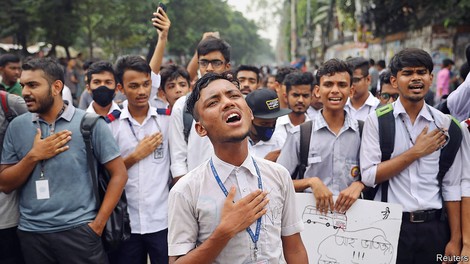Your podcast discovery platform
Curious minds select the most fascinating podcasts from around the world. Discover hand-piqd audio recommendations on your favorite topics.

piqer for: Doing Good Globalization and politics Global finds
Currently, I am a Fellow for the Entrepreneurship for Good Program (Future of Audio Entertainment Challenge) at The DO School. I am a media professional, social entrepreneur and storyteller who experiments with media and art to document life, and I have worked with nonprofits, governments and campaigns internationally. I have an M.Sc. in Social & Cultural Anthropology from the London School of Economics & Political Science.
School-Age Vigilantes: Why Bangladeshi Students Held Up Traffic
In Bangladesh, what began as a protest for pedestrian safety and stricter traffic laws emerged as a politically charged situation revealing the government’s insecurity and a lack of respect for press freedom and human rights.
On July 29, a bus drove over a crowd, killing two youths in the process. Outraged and tired, students took to the same streets that have become a bleak game of survival with yearly road fatalities totaling 25,000.
The government has done little other than to silence the groups of unarmed students through fear and force as elections are upcoming and dissent has been shown to be not welcome.
Critics of Prime Minister Sheikh Hasina and her government, whether they are non-violent students or journalists simply doing their job, have been swiftly responded to in a multitude of ways: Rubber bullets. Tear gas. Rape. Torture. Violent attacks by goons.
The renowned photojournalist and activist Shahidul Alam was taken from his home barefoot by police and arrested for peacefully expressing his concerns on international media outlet Al Jazeera. His words were: "The government has miscalculated. It thought that fear and repression would be enough but you cannot tame an entire nation in this manner."
But, at this moment, Sheikh Hasina has managed to suppress the country back under the authority of her thumb. However, time may prove her enemy:
The Awami League does not want Bangladesh’s children to upset its plans for a long rule. Yet two-thirds of the country’s population are under 35, and the feelings of students count. Not only do they fear for their safety but they sense they will be frozen out of job opportunities which fall only to the politically well-connected. Abrar Chowdhury of Dhaka University believes insensitive handling has turned an “innocuous low-key demand for reform” of public transport into an anti-government movement. “Our generation has failed,” he says. The students, by contrast, are “reclaiming the state for everyone”.
Stay up to date – with a newsletter from your channel on Globalization and politics.
